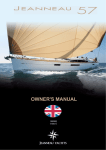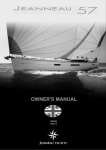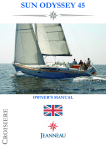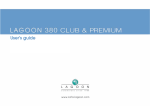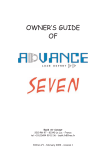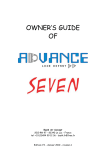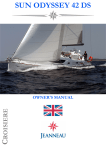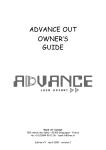Download BENETEAU FIRST 36.7 Owner`s manual
Transcript
FIRST 36.7 OWNER’S MANUAL FIRST 36.7 FR-BEY _ _ _ _ _ _ _ _ _ BENETEAU REF : 055194 SUMMARY: I) INTRODUCTION ................................................................................................................................................3 II) IDENTITY CARD OF THE BOAT....................................................................................................................4 III) ACCOMMODATION .......................................................................................................................................6 IV) DECK (Location of the life raft) ........................................................................................................................8 V) SAILS AND RIGGING ......................................................................................................................................9 VI) FRESH WATER SYSTEM .............................................................................................................................17 VII)BILGE PUMP SYSTEM.................................................................................................................................19 VIII) SEACOCKS AND SKIN FITTINGS ...........................................................................................................21 IX) ELECTRIC SYSTEMS ...................................................................................................................................23 X) GAS SYSTEM ..................................................................................................................................................29 XI) EMERGENCY SYSTEM OF THE STEERING SYSTEM ...........................................................................31 XII) MOTORIZATION .........................................................................................................................................32 XIII) HANDLING..................................................................................................................................................34 XIV) MAINTENANCE .........................................................................................................................................35 XV) ENVIRONMENT...........................................................................................................................................38 EXPLANATION OF THE TYPOGRAPHY USED: DANGER WARNING TAKE CARE MAJ ANG 09/07/01 FIRST 36.7 RECEIPT OWNER’S NAME ………………………………………………………………………….. ADDRESS ………………………………………………………………………….. ………………………………………………………………………….. ………………………………………………………………………….. Owner of the FIRST 36.7 n° ………………………………………………………………………………. Do certify that I have accepted delivery and read the information in the owner’s manual delivered with the boat. On ………………………………………… Signature Please keep this copy for your records ••••••••••••••••••••••••••••••••••••••••••••••••••••••••••••••••••••••••••••••••••••••••••••••••••• RECEIPT OWNER’S NAME : ………………………………………………………………………….. ADDRESS : ………………………………………………………………………….. ………………………………………………………………………….. ………………………………………………………………………….. Owner of the FIRST 36.7 n° ………………………………………………………………………………. Do certify that I have taken delivery and read the information in the owner’s manual delivered with the boat. On ………………………………………… Signature Please send back this copy to BENETEAU S.A ZI des Mares BP66 85270 Saint Hilaire de Riez FRANCE MAJ ANG 29/11/01 2/38 FIRST 36.7 I) INTRODUCTION Dear Madam, Dear Sir, You have just taken delivery of your new BENETEAU boat and we would like to congratulate you first of all for the confidence you showed to us in choosing a product of our mark. A BENETEAU boat is built to last : each boat is subject to particular care in the slightest details, as early as when she is designed, when she leaves the factory and she is launched ; this way, she will come up to your expectations for many years. This manual was meant to help you to enjoy your boat safely. You will find in it the details of your boat , her fittings and information about the use and maintenance. Read it carefully and get to know her before you put out to sea. If this is your first boat, or if you change to a new type of boat (to which you are not used) get some training to control and sail her , to ensure your safety and comfort. Then you will be able to assume the command of the boat. Your dealer, your national sailing association or your Yacht club will be very happy to recommend you local sailing schools or professional instructors. Have fine and safe sailing time. (1) Throughout their lives, our boats are regularly improved and benefit from our experience and our customers’ experience ; therefore the specifications given in this owner’s manual are not contractual and may be modified without prior notice and up dating obligation. In the same way, this manual has a general purpose and it may sometimes list some equipments or refer to some points which are not relevant to your own boat. In case of doubt, you shall always refer to the inventory list. KEEP THIS MANUAL IN A SAFE PLACE AND HAND IT OVER TO THE NEW OWNER IF YOU SELL THE BOAT. MAJ ANG 29/11/01 3/38 FIRST 36.7 II) IDENTITY CARD OF THE BOAT Type........................................................ Name of Builder .................................... Design Category ..................................... N° of acknowledged body ...................... FIRST 36.7 BENETEAU SA A CE 0607 Length of Hull Beam Draught: m m m m m 10.68 3.45 2.20 1.80 17.00 Deep keel Shoal keel Air draught Maxi Authorized Engine Power : Fuel Capacity Fresh Water Capacity Battery Capacity 25 kW 75 Litres 300 Litres 2x70 Amp Category Height of Waves (m) >4 <4 <2 < 0.5 A B C D Wind Force (Beaufort) >8 <8 <6 <4 For additional information concerning the fitted equipments, please refer to their manuals enclosed in the boat literature. Maximum recommended number of persons on board by design category: Category A B C D Number of persons 8 8 8 10 The CE certified equipments of the boat are : The fuel tanks, the parts of the steering system, the parts of the gas system and the hatches and portholes. (1) MAJ ANG 29/11/01 4/38 FIRST 36.7 WEIGHT ESTIMATION SAILING CATEGORIES A B C D 5 597 110 50 112 5 869 65 5 597 110 50 112 5 869 65 5 597 110 50 112 5 869 65 5 597 110 50 112 5 869 65 600 300 56 265 329 140 50 20 10 20 20 20 26 3 20 225 600 300 56 265 329 140 50 20 10 20 20 20 26 3 20 225 600 300 56 265 329 140 50 20 10 20 20 20 26 3 20 225 750 300 56 190 329 140 50 20 10 20 20 20 26 3 20 150 MAXIMUM LOAD DISPLACEMENT (Kg) 7 709 7 709 7 709 7 709 MAXIMUM LOAD (Kg) 1 840 1 840 1 840 1 840 Light Boat : Safety Equipment : Sail : Building margin : Light Displacement : Life Raft : Crew : Water : Fuel : Personal Equipment : Optional Equipment : Including teak deck : Holding Tank : Auto Pilot Gear : Spinnaker Rigging : Roof Sprayhood : Bimini Top : 3 batteries: Windlass : Charger 220 : Fridge : Margin for Extra Equipment : MAXIMUM LOAD = MAXIMUM LOAD DISPLACEMENT – LIGHT BOAT ANY OVERLOADING CARRIES A RISK OF FLOODING OR LOSS OF STABILITY MAJ ANG 29/11/01 5/38 FIRST 36.7 III) ACCOMMODATION MAJ ANG 29/11/01 6/38 FIRST 36.7 EXIT IN CASE OF FIRE The boat is delivered without any fire extinguisher. It is your own responsibility to comply with the laws and regulations of your own country (Number, capacity, type and place of fire extinguishers). We advise you at least to install an extinguisher less than 5 metres away from each berth, less than 2 meters away from the extinguisher aperture in the engine compartment, less than 2 meters away from any naked flame device and less than 1 meter avay from the helm pedestal. We advise a total capacity of the portable extinguishers reaching 8A/64B, each extinguisher having at least a 5A/34B capacity. The CO2 extinguishers shall be used to fight fires in the galley or electric fires. = Recommended Exits = Recommended locations for the extinguishers MAJ ANG 29/11/01 7/38 FIRST 36.7 IV) DECK - The safe lines can be fastened either on the mooring cleats or on the toe rail. Some boats are fitted with a foldaway swimming ladder. The swimming ladder shall be in its usual place as soon as you are on board. Make sure that the hatches and portholes are closed before you put out to sea. In case of rough sea, close the boat with her door and washboard so that no water may come into the boat Check that nothing blocks up the draining holes ; never seal them. 1 Location of the life-raft MAJ ANG 29/11/01 8/38 FIRST 36.7 V) SAILS AND RIGGING Specifications of the Sails : SAIL Total Main Sail Genoa (maxi) Spinnaker CRUISING 73 36 37 90 RACING 78.5 38 40.5 90 Specifications of the Standing Rigging: V : Vertical D : Diagonal MARK 1 2 3 4 5 6 CABLE V1 (Shroud) D1 (Lower Shroud) V2 (Upper Shroud) D2 (Inter) Forestay Backstay MAJ ANG 29/11/01 Ø mm m² m² m² m² m² I J P E LP SL SMW 14.15 3.975 13.85 4.75 5.75 13.86 7.09 m m m m m m m Mast with 3 spreaders – Rod rigging MARK ROD REF 10 8 1 2 V1 (Shroud) Dash 17 D1 (Lower Shroud) Dash 10 8 6 8 7 3 4 5 6 7 8 V2 (Lower Shroud) D2 (Inter) Forestay Backstay D3 V3D4 Dash 12 Dash 6 Dash 12 Dash 10 Dash 4 Dash 10 9/38 FIRST 36.7 DECK FITTING LAY OUT – CRUISING VERSION REF. 1 2 3 4 5 6 7 8 9 10 DESIGNATION Genoa Furling Line Genoa Halyard Reefing Line n° 2 Mainsail Sheet Mainsail Foot Tuning Line Boom Downhaul Reefing Line n° 1 Mainsail Halyard Linking Strap Genoa Traveller MAJ ANG 29/11/01 10/38 FIRST 36.7 DECK FITTING LAY OUT – RACING VERSION REF. 1 2 3 4 5 6 7 8 9 10 11 12 13 DESIGNATION Portside Spinnaker Halyard Genoa Halyard Reefing Line n° 2 Mainsail Foot Tuning Line Boom Downhaul Reefing Line n° 1 Mainsail Halyard Spinnaker Boom Topping Lift Starboard Spinnaker Halyard Linking Strap Genoa Traveller Spinnaker Barber Hauler Spinnaker Boom Downhaul MAJ ANG 29/11/01 11/38 FIRST 36.7 TUNING OF THE BACKSTAY – CRUISING AND RACING VERSIONS TACKLE FOR BOOM DOWNHAUL – CRUISING AND RACING VERSIONS REF. 1 2 3 4 DESIGNATION Block – Ø 60 2601 Block – Ø 60 1611 Double Block – H 127 Single Block H 168 x 3 REF. 1 2 3 4 REF. 1 2 3 4 5 6 7 8 DESIGNATION Triangular batten Tensioner Briddle cable 7 x 19 Tackle 1/6 DESIGNATION Block Ø 80 2801 Line in Dyneema Ø 12 Block Ø 60 2601 Line in Dyneema Ø 10 Block Ø 60 1611 Line in Dyneema Ø 8 Safety in Dyneema Ø 9 Tackle 1/6 MAJ ANG 29/11/01 12/38 FIRST 36.7 MAINSAIL TACKLE – CRUISING VERSION WITH TILLER MAJ ANG 29/11/01 13/38 FIRST 36.7 MAINSAIL TACKLE – RACING VERSION WITH TILLER MAJ ANG 29/11/01 14/38 FIRST 36.7 MAINSAIL TACKLE – CRUISING VERSION WITH STEERING WHEEL MAJ ANG 29/11/01 15/38 FIRST 36.7 MAINSAIL TACKLE – RACING VERSION WITH STEERING WHEEL MAJ ANG 29/11/01 16/38 FIRST 36.7 VI) FRESH WATER SYSTEM REF 1 2 3 4 5 6 7 8 9 10 13 14 15 16 DESCRIPTION Water Tank 150 l Water Tank 150 l Filler _ Fresh Water Tank Filler – Fresh Water Tank Vent Hole – Fresh Water Tank Collector Fresh Water System Filter – Fresh Water System Water Pump Foot pump – Fresh Water (optional) Boiler (capacity : 22 l) Galley Sink Washbasin/Shower Icebox – capacity : 90 l Fridge The fresh water system supplies the sink in the galley and the washbasins. This supply is made depending on the models, either by a manual pump, or by an electric pump ; before this pump there is a filter it is necessary to clean regularly. Never run an electric pump when the tank is empty otherwise it might be irreparably damaged. Never force the filling nozzle deep down the filler pipe in order to prevent any over pressure in the systems and keep an eye on the vent hole(s) through which the water in excess will be discharged. When the system has not been used for a long period of time, the tanks and pipes shall be cleansed with an acetic acid solution (white vinegar) The water flows out from the sink and wash basins through their own skin fitting seacocks ; Close them when the water system is not used. MAJ ANG 29/11/01 17/38 FIRST 36.7 LAY OUT OF THE FRESH WATER SYSTEM MAJ ANG 29/11/01 18/38 FIRST 36.7 VII) BILGE PUMP SYSTEM REF 1 2 3 4 5 6 7 8 9 10 11 DESCRIPTION Electric Bilge Pump 17 l/mn Filter of the Electric Bilge Pump Sump Manual Bilge Pump 0.75 l/each time Electric Bilge Pump Intake Manual Bilge Pump Intake Delivery of the Electric Pumps Manual Bilge Pump Delivery Shower Intake Filter of the Electric Shower Pump Electric Shower Pump 17 l/mn Make sure the bilge pump system is in good working order before you put out to sea. Make yourself acquainted with the way the bilge pump system of your boat works : - Locate the manual bilge pump and the handle which enables you to make it work. - Locate the on switch of the electric bilge pump and get to know how the seacocks work (for the boats fitted with an electric bilge pump). (See the lay out drawing of the system in the owner’s handbook) Make sure that the bilge pump intake strum box is not blocked with dirts. Regularly clean the intake strum box on the sump and the filter of the system in case of an electric pump. MAJ ANG 29/11/01 19/38 FIRST 36.7 LAY OUT OF THE BILGE PUMP SYSTEM MAJ ANG 29/11/01 20/38 FIRST 36.7 VIII) SEACOCKS AND SKIN FITTINGS Close all the seacocks when you leave the boat. The flushing toilets may be situated below the waterline ; get into the habit of systematically closing the seacocks after each use. Make sure that all the seacocks which are not used are closed before you put out to sea. (in the owner’s manual, see the drawing where the lay out of the skin fittings is shown). Opening and closing of the seacocks Open Closed REF 1 2 3 5 7 9 DESCRIPTION Heads Outlet Heads Intake Washbasin Outlet Sink Outlet Sea Water Foot Pump Intake – Icebox Outlet Log / Sounder Skin Fitting MAJ ANG 29/11/01 21/38 FIRST 36.7 SEACOCK AND SKIN FITTING LAY OUT MAJ ANG 29/11/01 22/38 FIRST 36.7 IX) ELECTRIC SYSTEMS When the voltage is not specified, all the functions or panels are in 12 Volts. 12V Electric System Never work on a live electric fitting. Never tamper with an electric fitting. Call in a technician qualified in marine electricity. The batteries must be carefully and safely stowed. In order to prevent a short circuit between the battery terminals, do not store conductive objects near the batteries (e.g. metal tools, ...) Never alter the specifications of the devices which protect against overstrength. Never fit or replace the electric materials or appliances by components which exceed the system amperage. 110V-220V Electric System Some boats are fitted with a 110V or a 220 V system (some as standard, others as an option, depending on the models). We advise you to follow the below mentioned steps in order to avoid the risks of electric shocks and of fire. Do not work on a live fitting. Connect the boat / shore supply cable in the boat before you plug it into the shore supply socket itself. Do not immerse the boat / shore cable sockets. Switch off the shore supply with the switch on board before you plug in or unplug the boat / shore supply cable. Do not tamper with the connections of the Boat / shore supply cable. Use only compatible connections. MAJ ANG 29/11/01 23/38 FIRST 36.7 ELECTRICITY LAY OUT 12V Electric Panel MAJ ANG 29/11/01 24/38 FIRST 36.7 LAY OUT OF THE 12V LIGHTS AND APPLIANCES REF 1 10 5 6 30 31 32 33 34 35 36 37 38 40 41 42 43 44 45 46 13 14 11 16 21 22 DESCRIPTION Bicolour Navigation Bow Light White Stern Navigation Light Mooring Light Steaming Light Ceiling Light Reading Light Reading Light Ceiling Light Ceiling Light Ceiling Light Reading Light Reading Light Neon Tube Ceiling Light Ceiling Light Ceiling Light Ceiling Light Ceiling Light Ceiling Light Ceiling Light Water Pump Bilge pump Fridge Shower Pump Water Tank Gauge Water Tank Gauge FUNCTION ON PANEL Navigation Lights Navigation Lights Mooring Light Steaming Light Cabin Lights Cabin Lights Cabin Lights Cabin Lights Cabin Lights Cabin Lights Cabin Lights Cabin Lights Cabin Lights Saloon Lights Saloon Lights Saloon Lights Saloon Lights Saloon Lights Saloon Lights Saloon Lights Water Pump Bilge pump Fridge Comfort Gauge n° 1 Gauge n° 2 12V FUNCTIONS REF FUNCTION 220 V FUNCTIONS AMPERAGE ( A) 10 5 5 10 10 10 5 10 10 10 10 16 10 10 A B C D E F G H I J K L M N Navigation Light Mooring Light Steaming Light Deck Light Cabin Lights Saloon Lights Instrument Lights DC 12 V Socket Water Pump Bilge Pump Fridge Comfort 1 Navigation Instruments VHF/HIFI O Spare 1 10 P Comfort 2 16 MAJ ANG 29/11/01 REF Q R S T FUNCTION General Power Supply Battery Charger 220 V Socket Boiler AMPERAGE (A) 70 16 10 10 25/38 FIRST 36.7 12V LIGHT AND APPLIANCE LAY OUT MAJ ANG 29/11/01 26/38 FIRST 36.7 LOCATION OF THE 110/220V SYSTEM (OPTIONAL) REF. 1 2 3 4 DESCRIPTION Shore Supply Socket Battery Charger 110/220V Socket Boiler MAJ ANG 29/11/01 27/38 FIRST 36.7 LAY OUT OF THE OPTIONAL EXTRA SHEATHES REF 2 1 4 5 6 6 DESCRIPTION Sheath from Panel to Automatic Steering Gear Sheath for the passage from Portside to Starboard Sheath from Panel to Mast Foot Sheath from Panel to Sounder Sheath from Windlass to Relay Box Sheath from Panel to Instrument Consol Passage in the hull inner moulding Passage in the deck inner moulding MAJ ANG 29/11/01 28/38 FIRST 36.7 X) GAS SYSTEM Gas Stove Do not fit or store flammable materials above or over the stove (Curtains, papers, napkins, and so on……). Never leave the boat unattended when the gas or spirit appliances are working. The appliances which use fuel consume the oxygen within the cabin and release the combustion products into the boat. It is necessary to ventilate the boat when the gas cooking appliances are working. Do not obstruct the air vents of the boat. Do not smoke or use a naked flame when you are trying to locate a gas leak or when you change the gas bottle or whenever you intervene on the gas system. If you smell gas or find that the burners have gone out, by accident, (although appliance models cut off the gas automatically if the flames go out) turn off the gas taps and do ventilate the boat in order to get rid of any residual gas. Find the root of the problem. For the stoves with an integral gas cylinder you shall change the cylinder outside the boat. Test the stove before you put it back in the galley. Pay particular attention to the stove fittings and make sure the stoves are locked after they have been put in their places. Do not use cooking appliances to heat the inside of the boat. Make sure that the taps of the burners are turned off before you turn on the tap of the hoses and of the cylinder. Turn off the tap on the feed hose and the taps on the cylinders when you do not use the appliances. Do not obstruct the access to the gas system components, in particular the access to the taps (cylinders and gas cooker). The flexible hoses which connect the gas cylinder at one end of the system and the stove at the other end, shall be changed in pursuance of the regulations in force in your country. Only use hoses which meet the safety standards of your country. Do not use the gas cylinder storage space to store other equipments. Pay particular attention to keep in good condition the screw thread of the cylinder on which the regulator is. Check the condition of the regulator every year and change it if necessary. Use a regulator identical to the ones which are fitted. Make sure that the taps of the empty cylinders are turned off and disconnected from the system. Do not use ammonia based products to clean it or to discover a leak. MAJ ANG 29/11/01 29/38 FIRST 36.7 Spirit Stove Some boats are fitted with a spirit stove. Do not smoke when handling the fuel. Keep the fuel in a can for this purpose, a good distance away from the stove, the engine and any other sources of heat. Follow the manufacturer’s recommendations as far as the filling of the burners is concerned. Do not pour the spirit directly into the burner over the stove. Only use methylated spirits. Petrol, oil, propane, diesel oil, fuel oil or other fuels and flammable materials are to be proscribed. Any fuel overflow out of the burner tank shall be wiped up immediately. LAY OUT OF THE GAS SYSTEM REF 1 2 3 4 MAJ ANG 29/11/01 DESCRIPTION Gas Locker Tap Regulator Gas Locker Ventilation 30/38 FIRST 36.7 XI) STEERING SYSTEM, EMERGENCY SYSTEM Boats who are fitted with a steering wheel carry an emergency tiller ; keep clear emergency tiller access. Lift the aft cover, open the cap, drive the emergency tiller into the print on the rudderstock head.. REF 1 2 3 4 5 6 7 8 DESCRIPTION Emergency Tiller Cap to the Rudder Stock Upper Bearing Rod of the Steering Wheel Rod of the Tiller Stop Sealing Washer Lower bearing Compensation Washer MAJ ANG 29/11/01 31/38 FIRST 36.7 XII) MOTORIZATION Stop the engine, do not smoke while you are filling up the fuel tank. Before you start the engine, make sure that the engine compartment bilge is clean and dry. If there is the slightest presence of fuel in the bottom, you must not start the engine. For the boats fitted with a petrol engine, ventilate the engine compartment for 5 minutes with the bilge ventilators so that the possible petrol vapours may be removed completely. For the outboard engines with a spare can, fill up the portable tank outside the boat in a well ventilated place and away from any risk of possible fire. The fuels that are stored outside the tanks (spare cans, jerrycans,...) shall be kept and stored in a ventilated place. Know exactly where the extinguisher aperture is located in the engine compartment bilge so you will be able to put out a fire breaking out in it. A fixed system of extinguisher which enables you to put out a fire breaking out in the engine compartment bilge is fitted in the boats with petrol engines. Know where the release mechanism is and the way it works. It is necessary to ventilate the engine compartment after this mechanism has been released. REF 1 2 3 4 5 6 7 8 9 10 11 DESCRIPTION Engine Ventilation Grid Engine Air Vent Anti- Siphon Vent Hole of Fuel Tank Extinguisher aperture Engine Battery Engine Block Fuel Gauge Baffle Box Service Battery Engine Control Handle in the Cockpit MAJ ANG 29/11/01 REF 14 6 17 19 23 24 25 26 27 28 29 DESCRIPTION Tank Propeller Exhaust Pipe Battery Breaker Exhaust Outlet Sea Water Filter Decanter Filter Engine Stop Control Pull Handle to Stop the Fuel Oil Intake Fuel Oil Filling Cap Stern Tube Seacock 32/38 FIRST 36.7 ENGINE LAY OUT MAJ ANG 29/11/01 33/38 FIRST 36.7 XIII) HANDLING Contact your BENETEAU dealer for the maintenance and repairs of your boat. He will advise properly, will supply you with the spare parts you need or the materials that are suited to your boat. Have your boat examined and maintained once a year during the winter storage. POSITION OF CRANING STRAPS AND CRADLE POSITION. MAJ ANG 29/11/01 34/38 FIRST 36.7 XIV) MAINTENANCE Because you have chosen to invest your money in a recreational item that spends its life in a harsh environment, it is very important to ensure that your boat is well and regularly maintained. Furthermore, a fair number of accidents are due to negligence and the lack of maintenance. These two reasons (the protection of your property and safety) must make you become aware of the importance of a regular and thorough maintenance of your boat. The advice you will find hereafter and your PERSONAL NOTES will help you. 1) THE HULL It is in laminated GRP. It is made with high quality products. However it would be wrong to assert that it will keep its original condition for life if you do not give over to it a minimum care. The gel coat is fragile and the knocks and scratches it might have when you manoeuvre might leave marks on it. Have always a member of your crew ready to put a fender at the right place. It will be useful to hose off the hull and deck with fresh water, as often as you can. Hull Preparation Beforehand, you may apply on the gel coat an epoxy paint ; it will protect the bottom (the careen) of your boat against the natural attacks of the sea environment. Moreover, the bottom shall be covered with a protective antifouling paint which will prevent the adhesion of the sea vegetation. When you apply the antifouling paint, be careful : do not paint the anodes, the heads of the electronic instruments and do not obstruct the strainers of the water intakes, in particular the strainers of the engine-cooling system. In all events, remove the grease from the bottom and slightly hand rub down with at least # 400 grit sand paper and water. Maintenance In order to keep the good looking gel coat of your boat, a preventive and regular maintenance of it is necessary. For this, do not hesitate to ask your dealer who will give you advice about the methods to follow and the most appropriate products to use. 2) THE DECK Regularly rinse the deck and deck fittings with fresh water. Regularly scrub the deck with a mild detergent liquid. Deck Fitting : Regularly lubricate the blocks, sheaves, turnbuckles, winches, windlass, rails, travellers, and so on with grease or light oil. Polish with an appropriate polish paste the stainless steels which may have small pits or superficial oxidisation pits. MAJ ANG 29/11/01 35/38 FIRST 36.7 The Outside Teak Woodworks : Scrub the woodworks using water. The teak woodworks do not need any particular protection. If you just rub them down with fine sandpaper, it will renovate the look of the teak. Plexiglass: Rinse with fresh water. Clean them using a sponge and a cleaning product for windows. The Rudder : Every year have the whole steering system overhauled. 3) INSIDE Whenever the weather makes it possible, air and ventilate regularly your boat, take off the floorboards, the berth spreads and put them vertically when you leave the boat. Protect the inside of your boat as often as you can with the fitted curtains. Make sure that the bilges are clean and dry. The internal woodworks are varnished in most of our boats ; therefore you have to rinse them with fresh water and a liquid detergent, then polish them with a chamois leather. The cleaning of the fabrics, cushions or lining of your boat depends on the materials used. Therefore you must contact a skilled specialist before you do anything. Fresh Water System It is possible to sterilize the tanks with Clonazone tablets (Dygerma in UK, or a product sold in your country and containing the equivalent molecule, i.e. Tosylchloramid) which are available at the Chemist’s. If the boat is not used for a long period of time, rinse the tanks and pipes with water and vinegar. Engine Have the whole drive system overhauled and maintained by a skilled mechanic and refer to the instructions by the engine manufacturer , These instructions are supplied with your boat. Keep the fuel tank as full as you possibly can in order to avoid condensation. 4) RIGGING You must examine once a year the running and standing rigging. Take advantage of this examination to maintain them. Carefully rinse the running rigging with fresh water at the end of each season. MAJ ANG 29/11/01 36/38 FIRST 36.7 5) SAILS Whenever it is possible, rinse the sails with fresh water and let them dry. The sails cannot stand the sun and water ; therefore, unrig them whenever you can or at least protect them, using appropriate covers. 6) WINTER STORAGE LAYING UP Remove from the boat all the documents of the boat, the lines which are not useful to moor the boat, the supplies, the clothes, the safety equipment, the batteries, the gas cylinder, and so on... Have your safety equipment overhauled. During this laying up period, draw up a complete inventory of the equipment on your boat. PROTECTION AND MAINTENANCE a) Inside: Drain the fresh water pipes and rinse them with water and vinegar. Close the water intake seacocks (except if your boat is dried out), rinse and drain the toilets pans and pumps. Store the sounder and speedometer heads. Carefully drain and dry all the bilges. Put the floorboards, the cushions and berth spreads vertically in order to favour the airing of the compartments. b) Outside : Rinse with plenty of water the hull, the deck, the deck fittings, lubricate all the mechanical and mobile parts. Protect your boat with fenders and make sure that the mooring lines are taut Fix the rudder so that it may not move c) Engine : Only a skilled mechanic can do the winter laying up of the engine. It will not be the same if the boat remains afloat or ashore. All THESE RECOMMENDATIONS DO NOT MAKE UP AN EXHAUSTIVE CHECK LIST. YOUR DEALER WILL GIVE YOU THE ADVICE YOU NEED AND WILL CARRY OUT THE TECHNICAL MAINTENANCE OF YOUR BOAT MAJ ANG 29/11/01 37/38 FIRST 36.7 XV) ENVIRONMENT Do not pour to the sea the oil you have just drained, use appropriate waste tanks. When you fill up the engine tank, take all the precautions in order to avoid the hydrocarbon overflowing. In the harbour, do not use the heads on board if they are not equipped with holding tanks. The use of detergent contributes to the deterioration of the sea fauna and flora ; choose entirely biodegradable products for your cleaning operations. Do not throw to the sea plastic bags and rubbish bags ; use the dustbins for this purpose in the places of call. You love the sea, just as we do ; therefore help us to protect it and do not pollute it. MAJ ANG 29/11/01 38/38







































